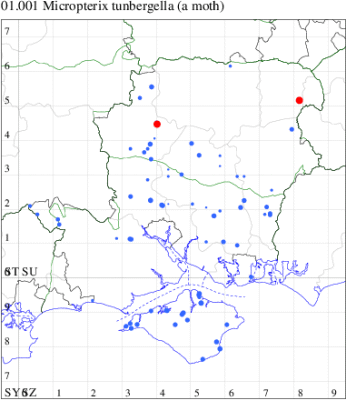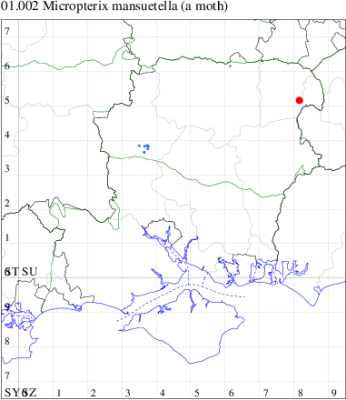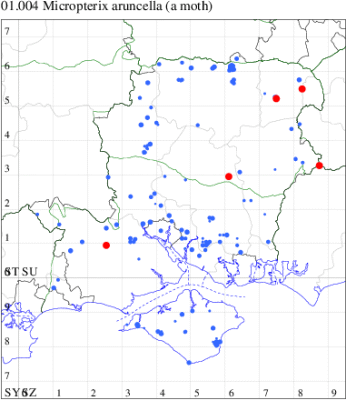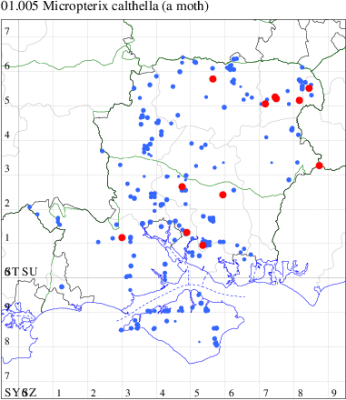2023 Annual Report for: Micropterigidae / Micropteriginae
For species seen in 2023 that had less than or equal to 100 records, full details are included; for more common species, the earliest, latest and highest count by vice-county are shown. The narrative for each species is taken from the main Hantsmoths website, and it is possible that some information on abundance and occurrence can get out of date, as it is impossible to keep up with all changes; however it should give a good introduction to each species. The tables in each species account summarise the previous status, and that for the current year.
For the maps, all records prior to 2023 are shown by a blue dot (the larger the dot, the more recent), with the current year's records shown in red. As previous records are superimposed on any report for 2023, new sites have greater emphasis (i.e. will show as 'more red').
In the species accounts, an asterisk next to a location indicates a new 10km square record; earliest ever dates are highlighted in orange, and latest ever in red. Initials in the species accounts refer to the recorders listed here. Please get in touch if you identify any omissions or errors, in particular if you have records that have yet to be submitted. Details of how to submit records can be found here.
01.001 [B&F: 0001] Micropterix tunbergella (Fabricius, 1787) - Local
Local in woodland throughout England and Wales as far north as the Lake District and Northumberland. Uncommon in Hampshire, where absent from the south-west and north-east, and on the Isle of Wight. Wingspan 8-11 mm. Adults have purple markings on a metallic golden ground and orange head tufts. The larval food is apparently unknown, various alternatives have been suggested, including the pollen of oak, sycamore and other plants, minute particles of leaf litter, and fungal hyphae; larvae have been found up to 10cm deep in stony woodland soil.
Records prior to 2023
| Vice County | #Records | #Individuals | First Record | Last Record |
|---|---|---|---|---|
| 10 | 24 | 120 | 1978 | 2022 |
| 11 | 39 | 44 | 1900 | 2020 |
| 12 | 26 | 37 | 1950 | 2019 |
2023 records
| Vice County | #Records | #Individuals | Max Quantity |
|---|---|---|---|
| 12 | 2 | 2 | 1 |

Records by year
Records by week (adult)
Records by week (larval)
Record Details
VC12: Harewood Forest, one, field observation, 07 May; Zebon Copse NR*, one, field observation, 13 May (BGD)
01.002 [B&F: 0002] Micropterix mansuetella (Zeller, 1844) - Nationally Scarce B
Nationally scarce (Nb) in very wet woodland, fens, marshes, river-banks and other freshwater margins throughout much of England. Restricted in Hampshire and the Isle of Wight to the Leckford area, until 2023 when it was discovered in the north-east of the county. Wingspan 7-9 mm. Fairly unmistakable. The larval food is apparently unknown.
Records prior to 2023
| Vice County | #Records | #Individuals | First Record | Last Record |
|---|---|---|---|---|
| 10 | 1 | 0 | 1947 | 1947 |
| 12 | 8 | 13 | 1974 | 1989 |
2023 records
| Vice County | #Records | #Individuals | Max Quantity |
|---|---|---|---|
| 12 | 1 | 2 | 2 |

Records by year
Records by week (adult)
Records by week (larval)
Record Details
VC12: Zebon Copse NR*, two, field observation, voucher retained, 13 May (BGD)
01.004 [B&F: 0004] Micropterix aruncella (Scopoli, 1763) - Common
Common throughout the British Isles, excluding Orkney and Shetland, in generally dry habitats such as downland and hillsides (unlike its congeners which are mainly woodland species), feeding on the pollen of many herbaceous plants and hawthorn. Fairly widespread and common in Hampshire and on the Isle of Wight. Wingspan 6-8 mm. Fairly unmistakable. Larva feeds on various liverworts and detritus.
Records prior to 2023
| Vice County | #Records | #Individuals | First Record | Last Record |
|---|---|---|---|---|
| 10 | 35 | 63 | 1929 | 2021 |
| 11 | 90 | 257 | 1968 | 2022 |
| 12 | 71 | 249 | 1940 | 2022 |
2023 records
| Vice County | #Records | #Individuals | Max Quantity |
|---|---|---|---|
| 11 | 1 | 1 | 1 |
| 12 | 4 | 4 | 2 |

Records by year
Records by week (adult)
Records by week (larval)
Record Details
VC11: Highland Water Inclosure, NF*, one, field observation, 28 May (AMD);
VC12: Cheriton Wood, one, field observation, 29 May (DAS); Odiham Common, present, field observation, 28 May (AMit); Hammer Bridge, Woolmer, one, field observation, 25 May (ASwa); Fleet Pond, two, field observation, 01 Jun (MHals)
01.005 [B&F: 0005] Micropterix calthella (Linnaeus, 1761) - Common
Common in damp woodland, woodland rides and woodland clearings throughout Britain and Ireland, often swarming on flowers of a wide range of herbaceous plants, such as buttercup, sedges and dog's mercury, feeding on the pollen. In Hampshire and on the Isle of Wight well distributed and fairly common, sometimes abundant. Wingspan 7-10 mm. Adults have metallic bronze forewings with purple blotch at base, and orange head tufts. Larva feeds on plant detritus and also, perhaps, various liverworts.
Records prior to 2023
| Vice County | #Records | #Individuals | First Record | Last Record |
|---|---|---|---|---|
| 10 | 49 | 320 | 1929 | 2022 |
| 11 | 200 | 2902 | 1972 | 2022 |
| 12 | 154 | 3443 | 1974 | 2022 |
2023 records
| Vice County | #Records | #Individuals | Max Quantity |
|---|---|---|---|
| 11 | 5 | 8 | 5 |
| 12 | 7 | 184 | 75 |

Records by year
Records by week (adult)
Records by week (larval)
Record Details
VC11: Brockishill Inclosure, NF, two, field observation, 07 May (JAda); Wildern LNR, Hedge End, one, field observation, 22 Apr (TCrw); Twyford, present, field observation, 04 May (iNat); Botley Wood, five, attracted to blossom, 10 May (DWal); Kilmeston area, South Downs*, present, field observation, 14 May (JHol);
VC12: Ewhurst Park, Ramsdell, one, field observation, 17 May (ACB); Greywell, 75, field observation, 19 May (KBW); Odiham Common, three, field observation, 26 May (AMD); present, field observation, 28 May (AMit); Hammer Bridge, Woolmer, 10, field observation, 25 May (ASwa); Zebon Copse NR, 75, field observation, voucher retained, 13 May (BGD); Southwood, Rushmoor, 20, field observation, 13 May (MThmp)